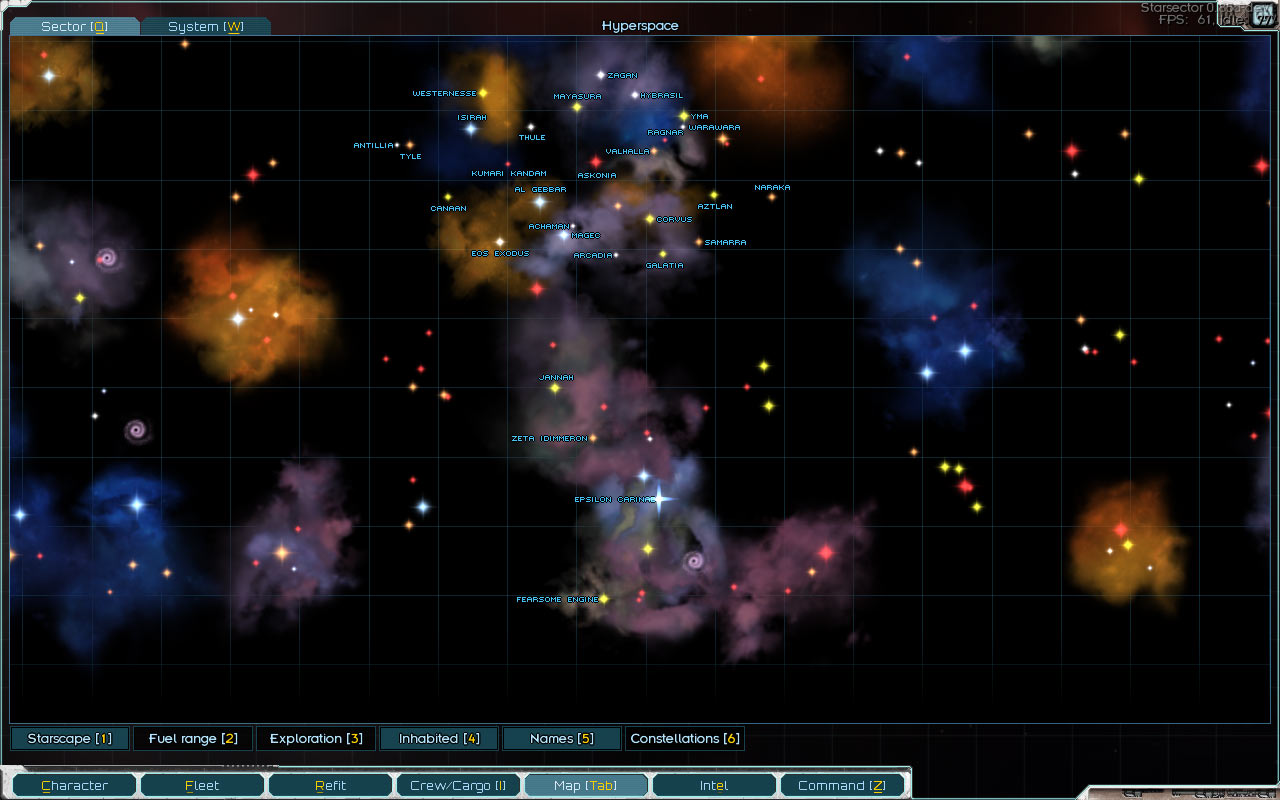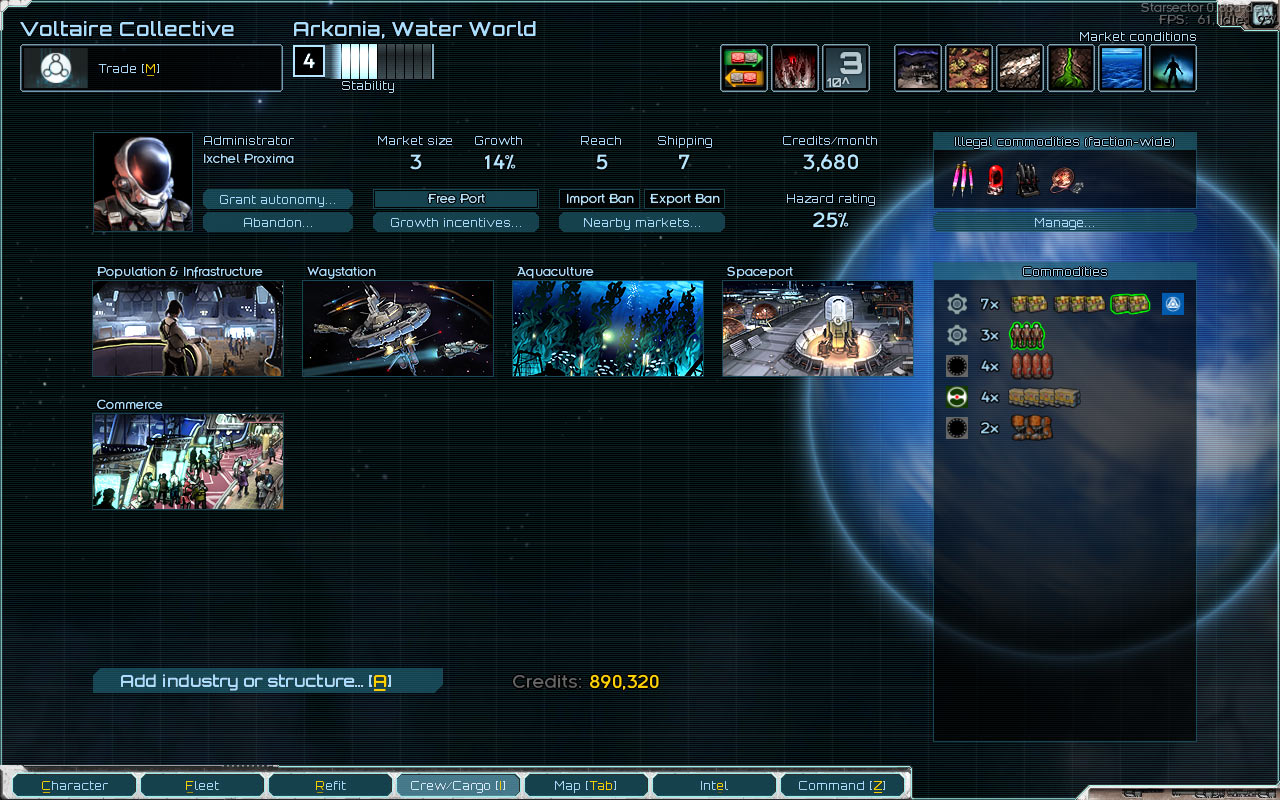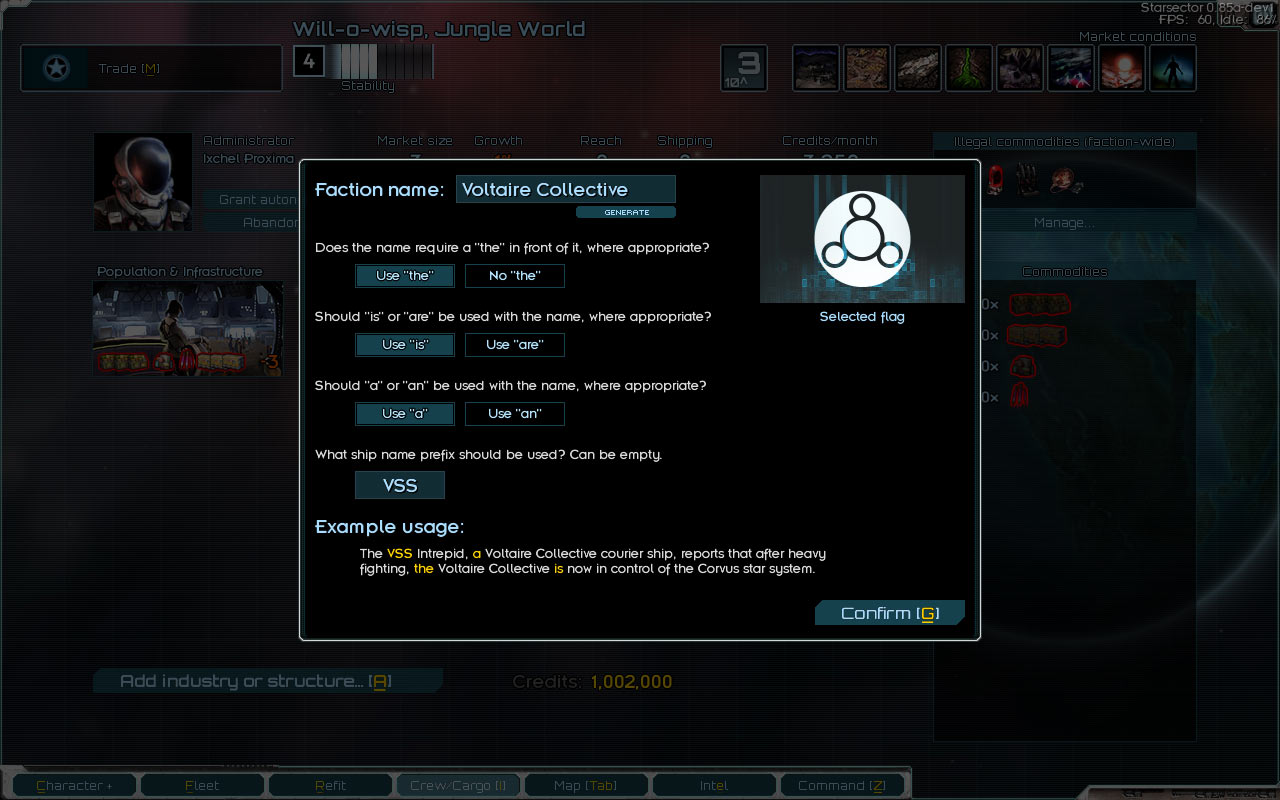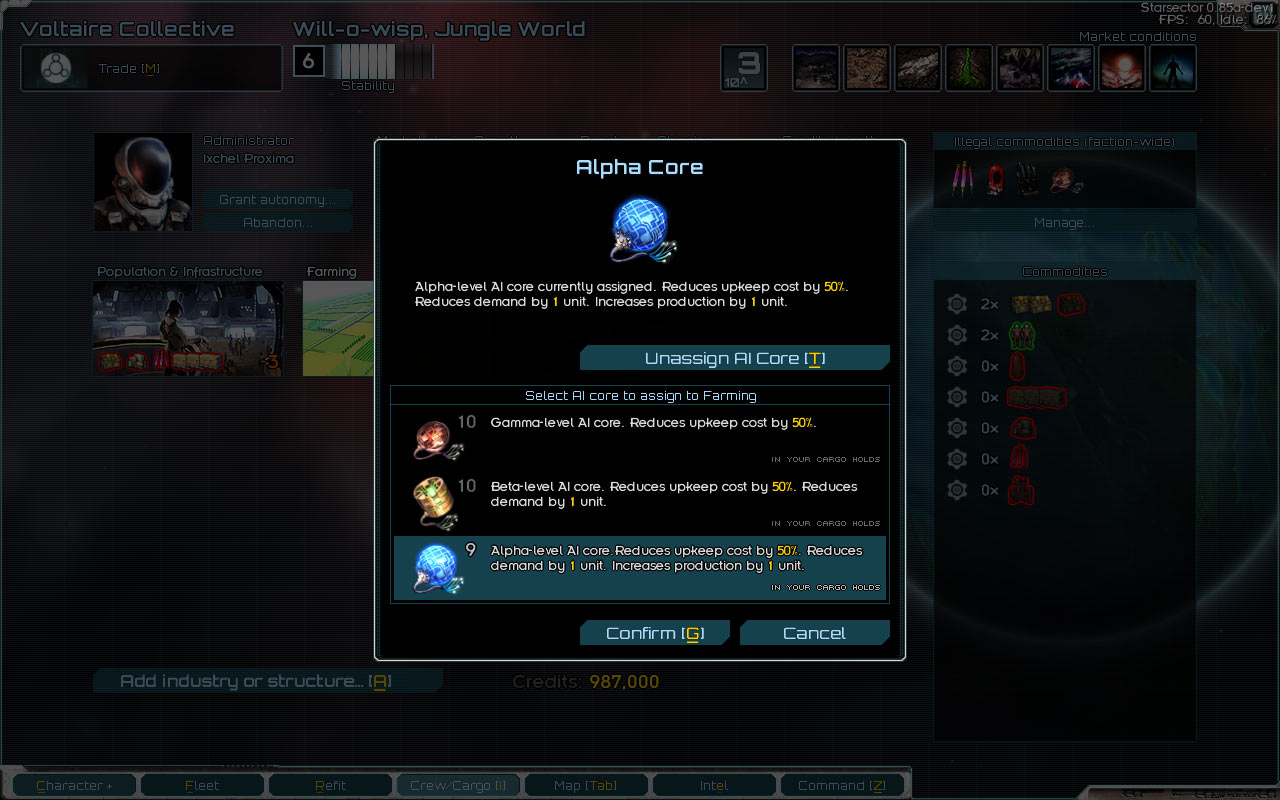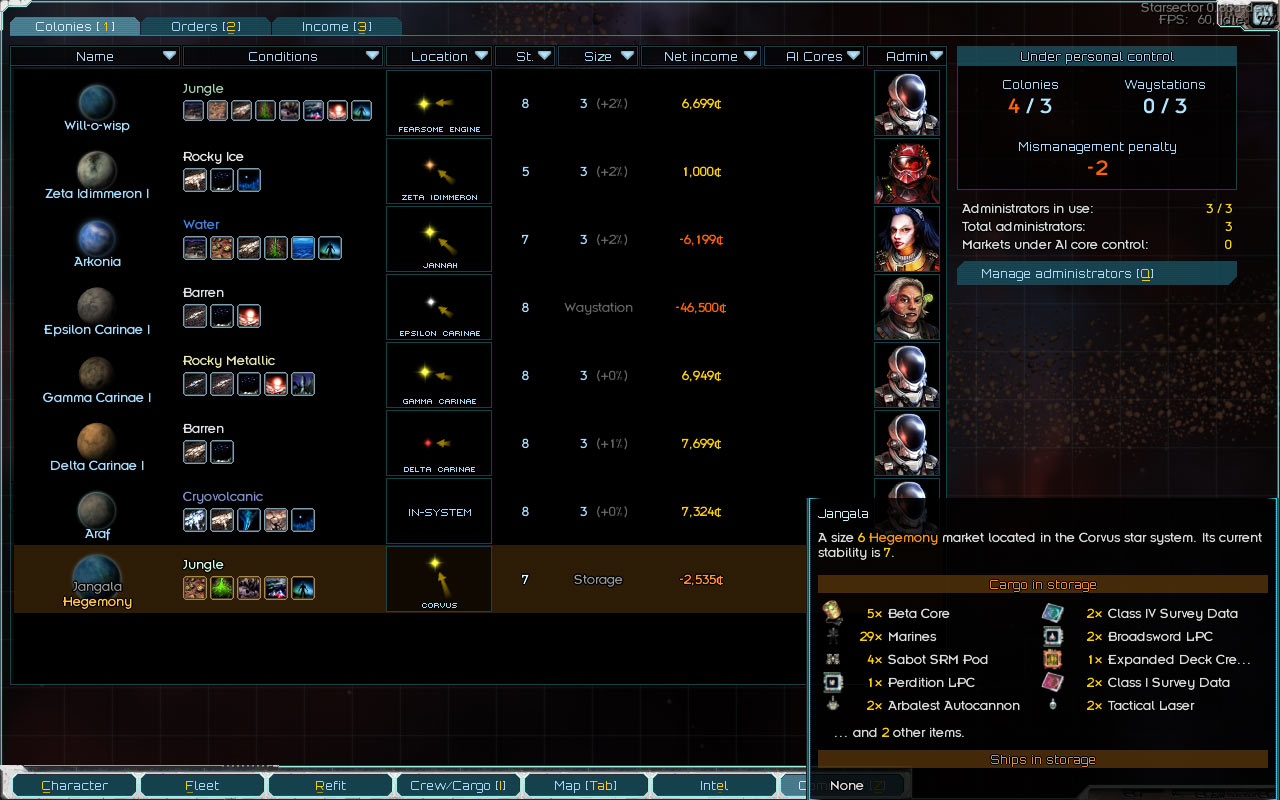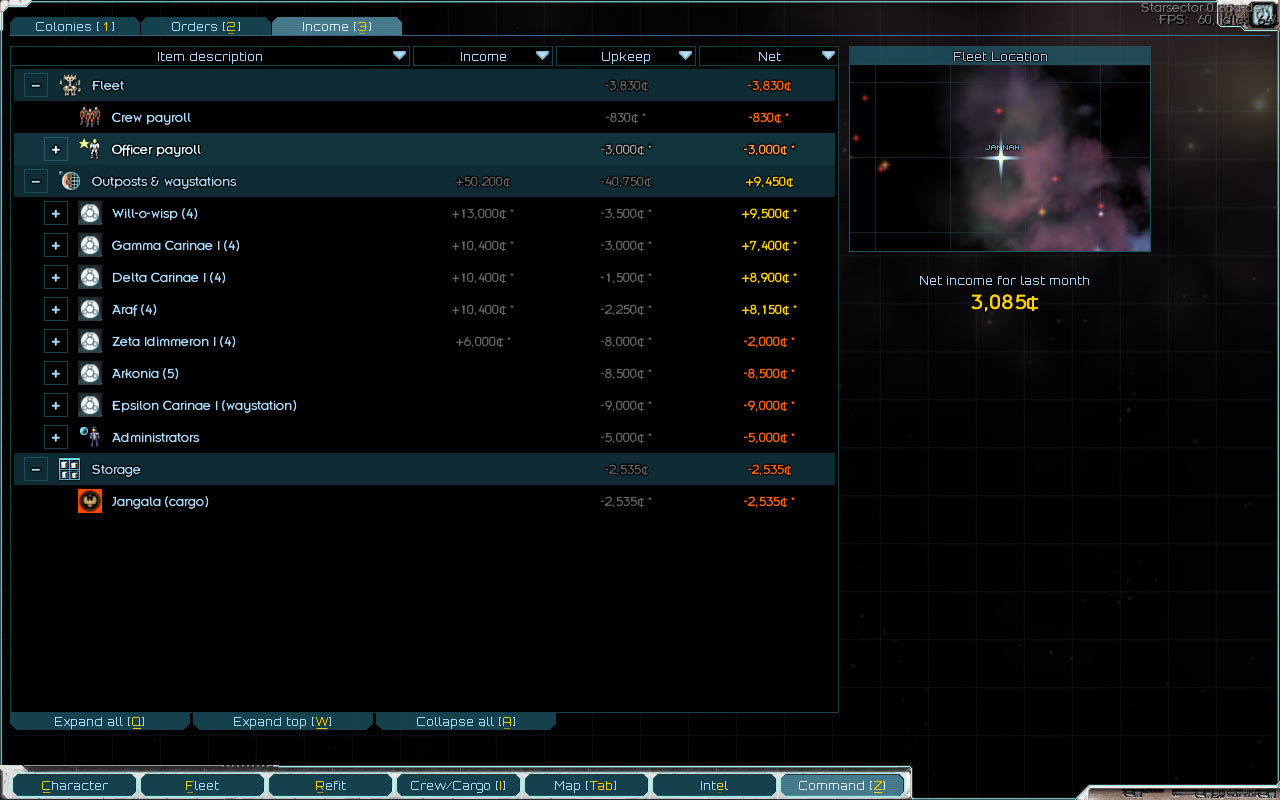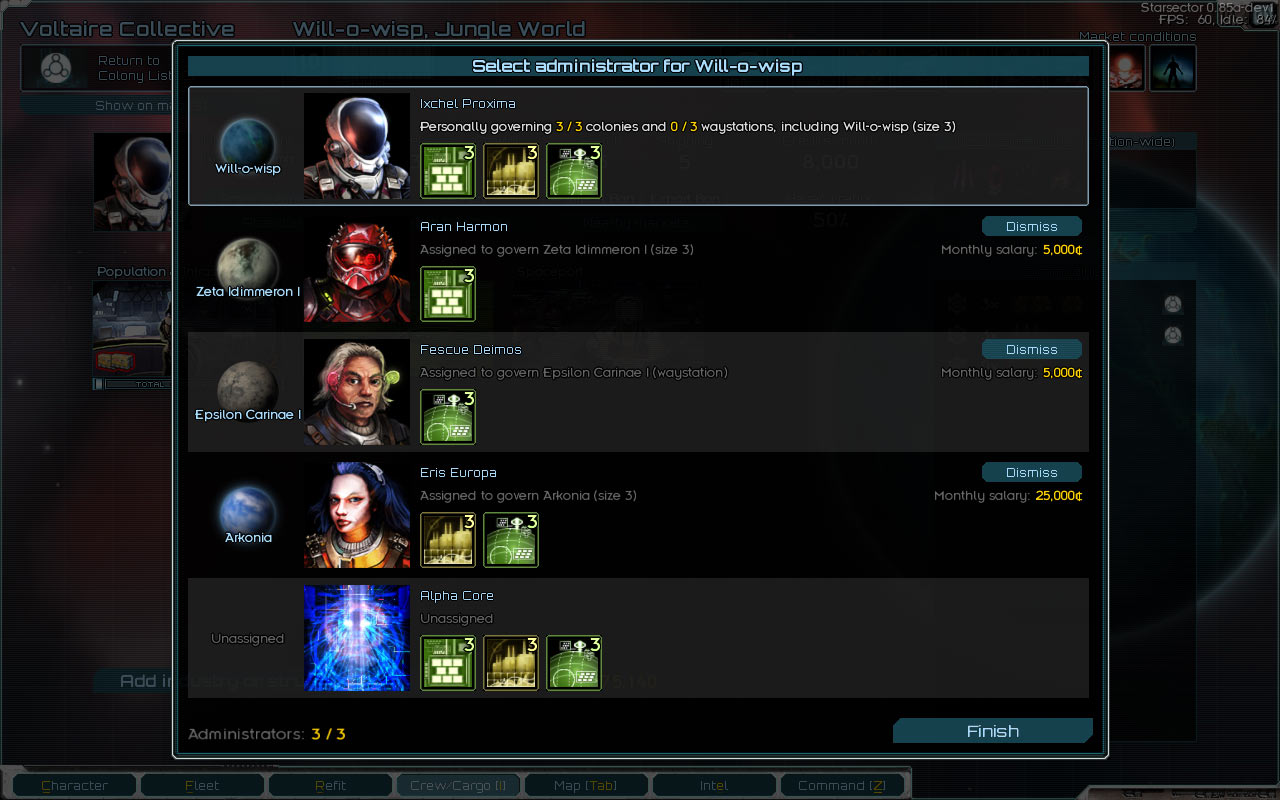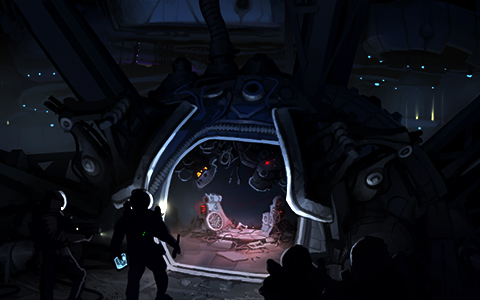Colony Management
I’ve been making steady progress fleshing out the various colony-related mechanics, and though there’s still a lot to do there (in a way, everything for the next release has to do with colonies), there’s also a mostly-completed set of features to talk about.
First, however, a quick aside on game design. I haven’t talked very much about how colonies tie in with the rest of the game, especially with combat. The idea is that colonies give you money and power, but also attract various sources of trouble, from pirates to major factors to everything in between. Left unprotected, you colonies would have serious problems, all the way up to being lost entirely.
So, having colonies will lead to fighting more battles, and provide reasons to fight, beyond immediate gains from combat – which can often be (intentionally!) sparse. Exploration also leads to combat – fighting pirates, scavengers, and REDACTED. The reward for successful exploration (aside from the immediate shinies) is more profitable and powerful colonies – through abandoned installations you might find in a system, the planets you find to colonize, and so on. This in turn leads to more combat.
That’s the overall flow – just about everything you do funnels you into combat, either directly or indirectly, and colonies are a key game element for doing that in an escalating manner as the game progresses.
With that, back to colony management details that aren’t directly combat-related!
Establishing Colonies
To establish a colony (or a waystation, which lets your colonies connect up with far-away markets, either to import necessities or to export goods for profit), you need to survey a planet and then bring a bunch of crew, supplies, and machinery. Getting the requisite resources is expensive for the early game, and getting your first colony up and running should feel like a bit of an achievement.
When you establish your first colony, you also get to name your faction, and select the flag you’d like to use. You can change the name and flag at any time – it might not make in-fiction sense to rename one’s faction, but I see it more as the player retconning their history – Oceania had always been at war with Eurasia and all that. In a similar vein, you can also rename your colonies at any time.
Something I found interesting – and that wasn’t immediately obvious to me – is when to use “a” vs “an”. My first thought was that when a proper noun starts with a vowel, you use “an”, but that’s not actually correct – it’s when it sounds like it starts with a vowel. For example, it’s “a university” and “an hour”. Whether to use “the” or not is even more of a morass, so, the player gets to pick what’s right for their faction name, instead of the game making a foredoomed effort to guess at it correctly.
Building Up
A new colony starts out with “Population & Infrastructure” and no other structures or industries. Building an industry – such as Mining – costs credits and takes some time.
Population provides a base level of income, while industries have an upkeep cost, which goes up with the planet’s hazard rating. A high-hazard planet can only support a few industries before going into the red, so there’d better be some compelling reason to colonize one – such as, say, rich ore deposits. Even then, it makes sense to keep a the number of industries/structures at a high-hazard colony minimal, even though skimping on planetary defenses is a risk.
Industries and structures can be shut down for a refund of most of their credit cost. The idea is that if poor planning or bad luck leads to a situation where money is short and expenses exceed income, there’s a way to recover – a shutdown will both give a hefty amount of credits and reduce ongoing expenses.
All industries can be enhanced by assigning an AI core to help manage it. The exact effects will vary in some cases – for example, for Mining, an Alpha Core will increase resource output by 1, but that sort of bonus is not at all helpful for a battlestation. Of course, the use of AI technology is a contentious issue in the Sector, and various parties may take an active interest in their industrial application.
Submarkets
A new colony has a “Storage” and a “Local Resources” submarket. Storage works like storage on other factions’ markets, except that it’s free. “Local Resources” is special – a portion of the resources produced by the colony will be put there, and any resources deposited there by the player will be absorbed by the colony as they’re needed. For example, bringing a couple of superfreighters’ worth of Food can insure a fledgling colony against food shortages for a very long time.
By default, there’s no “Open Market” on a colony you establish, meaning that you can’t, for example, use it to sell off excess supplies. Establishing a “Commerce” industry adds an independent “Open Market” you can trade at, with tariffs and all. Commerce also adds a small amount of passive income.
Colony List
There’s a new screen to keep track of your colonies, showing a list along with some vital information. Clicking on a colony in this list brings up the market info screen, where you can manage it. Markets where you’ve bought access to storage also show up in this list, with a tooltip showing what you have in storage there. To keep clutter down, if storage is empty, the market doesn’t show up in this list at all.
Note that this screen allows you to interact with a colony remotely. Since building industries costs credits instead of more tangible resources, you can order industries built, upgraded, shut down, and so on without actually being there. Installing AI cores to enhance an industry is the only action so far that requires a physical item. When done remotely, it’ll use any AI cores in Storage or Local Resources; using AI cores from your cargo holds requires you to actually be there.
Income & Expenses
As I mentioned earlier, population and commerce bring income, while all industries and structures (including population and commerce) also have an upkeep cost, based on the planet’s hazard rating. If one of your colonies exports something to a market belonging to another faction, that’ll result in additional income as well.
In addition, storage at a market you don’t own has a monthly fee based on the value of what’s stored – representing rent, security expenses, etc. This should gently nudge players towards establishing their own colonies, although the fee is rather small, just 1% of the total stored value per month.
Finally, crew, officers, and planetary administrators (more on those in a bit) all draw salaries. In the case of crew, the salary is small and is mainly there to make crew feel a bit less like cargo. For officers and administrators, the salaries are more significant.
There’s lots of room for other mechanics to tie in here – for example, I could see taking a commission resulting in the player receiving a monthly stipend based on the size of their fleet, or “easy” mode giving the player a similar monthly stipend for the first year. (An inheritance, let’s say.)
Overall, the goal is to make “a bit of monthly income” fairly simple to achieve, with higher levels of income being a greater challenge. At the start of the game, before the player establishes an outpost, the balance of income vs expenses will be negative – to the tune of a little under 1000 credits per month. This is not negligible, but it might even be balanced out entirely by the more reliable and lower prices of supplies and fuel (this being due to the new economy simulation). If it isn’t, there are other levers for tuning the early-game difficulty.
The main point I want to make here is that monthly income and expenses are meant to give you credits to spend on what will hopefully be multiple end-game activities, rather than to make the game more difficult or punishing, although it certainly could be used for that as well.
Administrators
There’s a soft limit on the number of colonies and waystations the player can personally govern. Going over the limit results in a “mismanagement” stability penalty for all of the personally-governed outposts. Since stability is, among other things, an income multiplier, this means there’s no incentive for the player to just plop down colonies everywhere for their population income – that’ll go to zero quickly.
Waystations and colonies are tracked separately here so that they don’t compete against each other – otherwise, it’s likely that a waystation would too often be a “wasted” colony slot, even if it counted at a fraction of the value.
The player can also hire a limited number of administrators to manage their colonies for them. These don’t count against the personal limit and (as of this writing, though I’m still thinking about it) don’t suffer from the mismanagement penalty.
The player can invest in a “Colony Management” skill (under the Industry aptitude) to raise the number of colonies, waystations, and administrators they can have.
Initially, I was considering having two separate skills – one for maximum administrators, one for waystations and colonies – but we really don’t want too many skills that bump up stats like these, at the expense of more fun/active skills, so making these denser seems like a good idea.
I still want to have those sorts of skills in the game, though, since ultimately I think they”ll feed back into combat again – a player that has high colony management, for example, might end up fighting battles with more friendly ships on their side, offsetting a lack of more direct combat skills and resulting in a different-feeling playstyle.
Administrator Skills
So, aside from taking the task of governing a colony off your hands, do administrators do anything to improve its performance? In some cases, the answer is no, and their hiring cost and salary are low to reflect that. They do the job, but there’s nothing exceptional about their performance.
Other administrators, as well as the player, have access to certain colony-and-waystation boosting skills.
Industrial Planning
Found under Industry, this skill boosts production and income. This is the “more money” skill choice.
Fleet Logistics
An existing skill under Leadership, this gets additional bonuses to outposts – increasing their reach, shipping capacity, and the size of the fleets they produce. The details there are a bit TBD, bit it’s intended as the “better offense” skill choice.
Planetary Operations
Also under Leadership, this skill boosts the effectiveness of planetary defenses (all specific effects TBD) and, if taken by the player, the effectiveness of raiding/ground operations performed by their fleet (all effects also TBD). For an administrator, this is a “better defense” skill choice.
Most administrators you’re able to hire will either have no skills at all, or just one of these, and they don’t level up, so the skills they have don’t change or improve. A few administrators will have two skills, though they’re very rarely available for hire – but much more likely to be found in sleeper pods on the fringe of the Sector.
The choice of administrator, then, will be:
- Unskilled – cheap, but provides no bonuses
- A pick to enhance either income, offense, or defense
- A 2-skill admin, with a higher monthly salary, and difficult to find as well – useful for larger colonies, probably not as economic for smaller ones
In addition, an Alpha Core can be assigned to govern an outpost. It has all 3 skills maxed, draws no salary, and is not subject to the normal administrator limit. An option that makes all the other choices terrible in comparison, with no apparent downside? Seems like poor design, if you ask me.
Comment thread here.
Tags: 1984, administrator, AI core, alpha core, campaign, colony, waystation
